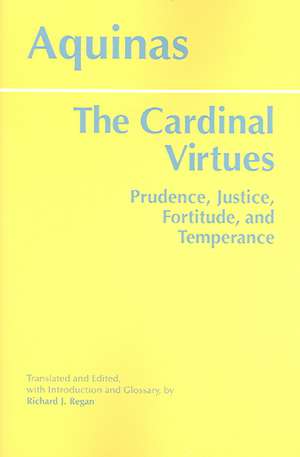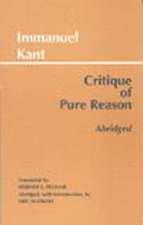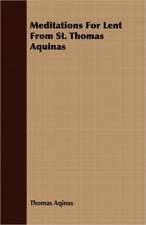The Cardinal Virtues: Prudence, Justice, Fortitude, and Temperance
Autor Thomas Aquinas, Richard J. Regan, S. J.en Limba Engleză Paperback – 15 sep 2005
| Toate formatele și edițiile | Preț | Express |
|---|---|---|
| Paperback (1) | 118.90 lei 3-5 săpt. | +19.65 lei 6-10 zile |
| Hackett Publishing Company – 15 sep 2005 | 118.90 lei 3-5 săpt. | +19.65 lei 6-10 zile |
| Hardback (1) | 291.18 lei 3-5 săpt. | |
| Hackett Publishing Company – 15 sep 2005 | 291.18 lei 3-5 săpt. |
Preț: 118.90 lei
Preț vechi: 129.57 lei
-8% Nou
Puncte Express: 178
Preț estimativ în valută:
22.75€ • 23.51$ • 18.94£
22.75€ • 23.51$ • 18.94£
Carte disponibilă
Livrare economică 05-19 martie
Livrare express 18-22 februarie pentru 29.64 lei
Preluare comenzi: 021 569.72.76
Specificații
ISBN-13: 9780872207455
ISBN-10: 0872207455
Pagini: 192
Dimensiuni: 9 x 215 x 14 mm
Greutate: 0.22 kg
Editura: Hackett Publishing Company
Colecția Hackett Publishing Company, Inc (US)
ISBN-10: 0872207455
Pagini: 192
Dimensiuni: 9 x 215 x 14 mm
Greutate: 0.22 kg
Editura: Hackett Publishing Company
Colecția Hackett Publishing Company, Inc (US)
Recenzii
Thomas Aquinas is still known in ethics primarily as the quintessential theorist of natural law--this despite the fact that his writings on that subject are quite meager in comparison to his exhaustive and masterly treatments of the virtues. The result of Richard Regan's labors is an introduction to Thomas' moral philosophy that is much more indicative of Thomas' rich reflections on the moral life than is available from the study of his natural law writings alone, making accessible Thomas' insights into the cardinal virtues of justice, prudence, courage, and temperance. --Douglas Kries, Associate Professor of Philosophy, Gonzaga University
There are perils here for a clumsy editor. Some of the material inviting excision is comparatively ephemeral but some is so integral to the work that its exclusion would leave us with a seriously distorted patchwork with few clues as to the overall world-view of the author. There is also a good deal of material that is contrary to contemporary culture and which timidity would suggest be excised. But Regan's editorial hand is deft. If mortal and venial sin, salvation, the value of consecrated virginity, the immorality of taking interest on a loan are unpalatable to the modern reader, he does not see that as any reason for excluding them. We find startling the prohibition of lying to the enemy in time of war, and the observation that it is permissible to resist an unjust death sentence 'except perhaps, in order to avoid scandal, when resistance might risk a serious public disturbance' (86). This is just one example of the profoundly counter-cultural weighting of the community over the individual in the Natural Law tradition (This is very briefly but effectively flagged by Regan in his Introduction). The extent of the condensation [in Regan's edition] is considerable. . . . Surely he must have left out something of value? I searched for unfortunate omissions. Did he include the distinction between virtue and skill (in terms of intentional failure)? Yes. Does the thesis of the unity of the virtues survive? Yes again. Is the possibility of prudence in sinners included? Yes it is, and the search for omissions begins to seem a waste of time. . . . I would judge the translation to be a fine effort. --Brian Scarlett, The Medieval Review
Richard J. Regan's translation and introductory explanations are highly readable and very accessible to the average student. There is a wealth of material contained in this small volume. It could serve not only as a useful text in an ethics course, but also as a convenient initiation to Aquinas' thought and method. --Rev. Gerald E. Twaddell, Department of Philosophy, Thomas More College
There are perils here for a clumsy editor. Some of the material inviting excision is comparatively ephemeral but some is so integral to the work that its exclusion would leave us with a seriously distorted patchwork with few clues as to the overall world-view of the author. There is also a good deal of material that is contrary to contemporary culture and which timidity would suggest be excised. But Regan's editorial hand is deft. If mortal and venial sin, salvation, the value of consecrated virginity, the immorality of taking interest on a loan are unpalatable to the modern reader, he does not see that as any reason for excluding them. We find startling the prohibition of lying to the enemy in time of war, and the observation that it is permissible to resist an unjust death sentence 'except perhaps, in order to avoid scandal, when resistance might risk a serious public disturbance' (86). This is just one example of the profoundly counter-cultural weighting of the community over the individual in the Natural Law tradition (This is very briefly but effectively flagged by Regan in his Introduction). The extent of the condensation [in Regan's edition] is considerable. . . . Surely he must have left out something of value? I searched for unfortunate omissions. Did he include the distinction between virtue and skill (in terms of intentional failure)? Yes. Does the thesis of the unity of the virtues survive? Yes again. Is the possibility of prudence in sinners included? Yes it is, and the search for omissions begins to seem a waste of time. . . . I would judge the translation to be a fine effort. --Brian Scarlett, The Medieval Review
Richard J. Regan's translation and introductory explanations are highly readable and very accessible to the average student. There is a wealth of material contained in this small volume. It could serve not only as a useful text in an ethics course, but also as a convenient initiation to Aquinas' thought and method. --Rev. Gerald E. Twaddell, Department of Philosophy, Thomas More College

















